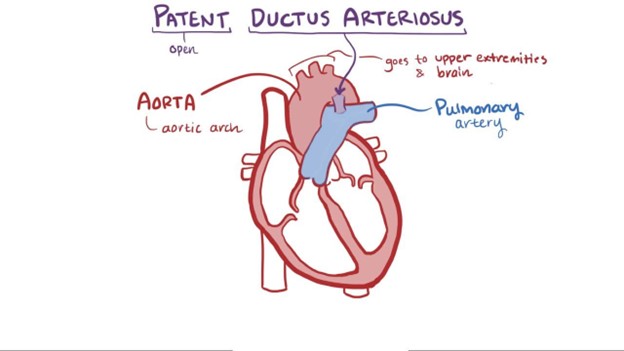A nurse is discharging a child who has sickle cell anemia after an acute crisis episode. Which of the following instructions should the nurse include in the teaching?
"Offer fluids to your child multiple times every day.
"Restrict outdoor play activity to 1 hour per day.
"Monitor your child's temperature daily."
"Apply cold compresses when your child expresses pain
The Correct Answer is A
Children with sickle cell anemia are prone to dehydration, which can worsen the sickling of red blood cells and trigger a sickle cell crisis. Therefore, it is essential to maintain good hydration to prevent crises. Offering fluids to the child multiple times every day helps to keep them well-hydrated.
Option B is not necessary unless there is a specific medical reason to restrict outdoor play. Regular play is essential for a child's physical and emotional development.
Option C is important, but it is not specific to discharge teaching after an acute crisis episode. Monitoring the child's temperature daily is essential to detect early signs of infection, which can be a trigger for sickle cell crises.
Option D is not recommended because applying cold compresses can cause vasoconstriction and may worsen pain in children with sickle cell anemia. Heat therapy, warm compresses, or a warm bath are more appropriate for pain relief during a sickle cell crisis. However, pain management should be discussed with the healthcare provider to ensure the most appropriate approach for the individual child's needs.
Nursing Test Bank
Naxlex Comprehensive Predictor Exams
Related Questions
Correct Answer is C
Explanation
A.Factor X is a clotting factor involved in the coagulation cascade. It is not directly related to preventing infections. While clotting factors are essential for hemostasis, they do not play a role in infection prevention.
B. Steroids can suppress the immune response, making the child more susceptible to infections. Therefore, they are not specifically administered to prevent infections
C. In a child with a sickle cell crisis who is hospitalized, preventing infections is crucial due to the increased risk of infections in this condition. Administering immunizations that the patient is scheduled for can help prevent certain infections.
Children with sickle cell disease are at a higher risk of bacterial infections, especially from encapsulated organisms like Streptococcus pneumoniae and Haemophilus influenzae. Vaccines can help protect against these pathogens and reduce the risk of serious infections.
Some of the recommended immunizations for children with sickle cell disease include:
Pneumococcal vaccine: This helps protect against infections caused by Streptococcus pneumoniae, which can cause severe respiratory and bloodstream infections.
Haemophilus influenzae type B (Hib) vaccine: This protects against infections caused by Haemophilus influenzae type B, which can lead to serious illnesses like pneumonia and meningitis.
Meningococcal vaccine: This protects against Neisseria meningitidis, which can cause meningitis and bloodstream infections.
Influenza vaccine: This annual vaccine helps protect against seasonal flu, which can be severe in children with sickle cell disease.
Administering these vaccines according to the recommended schedule helps provide protection against certain infections and can improve outcomes for children with sickle cell disease during hospitalization and beyond. The other options, Factor X, steroids, and PCA morphine, are not specific measures for preventing infections in a child with sickle cell crisis.
D.PCA (patient-controlled analgesia) morphine is used for pain management during a sickle cell crisis. It does not directly prevent infections.
Correct Answer is B
Explanation
A patent ductus arteriosus (PDA) is a congenital heart defect associated with increased pulmonary blood flow. In normal fetal circulation, the ductus arteriosus allows blood to bypass the lungs since the baby receives oxygen from the mother's placenta. After birth, the ductus arteriosus should close, redirecting blood flow to the lungs for oxygenation. However, in some infants with PDA, the ductus arteriosus remains open, causing an abnormal connection between the aorta and the pulmonary artery. As a result, oxygenated blood from the aorta flows back into the pulmonary artery, increasing the workload on the lungs.
The other options are as follows:
A. Coarctation of the aorta - Coarctation of the aorta is a narrowing of the aorta, which obstructs blood flow and leads to increased blood pressure in the upper body and reduced blood flow to the lower body.
C. Tetralogy of Fallot - Tetralogy of Fallot is a combination of four heart defects that results in decreased pulmonary blood flow due to a ventricular septal defect (VSD), overriding aorta, pulmonary stenosis, and right ventricular hypertrophy.
D. Tricuspid atresia - Tricuspid atresia is a congenital heart defect where the tricuspid valve does not develop correctly, resulting in an absent or abnormal tricuspid valve. This defect prevents blood flow from the right atrium to the right ventricle and, therefore, reduces pulmonary blood flow.

Whether you are a student looking to ace your exams or a practicing nurse seeking to enhance your expertise , our nursing education contents will empower you with the confidence and competence to make a difference in the lives of patients and become a respected leader in the healthcare field.
Visit Naxlex, invest in your future and unlock endless possibilities with our unparalleled nursing education contents today
Report Wrong Answer on the Current Question
Do you disagree with the answer? If yes, what is your expected answer? Explain.
Kindly be descriptive with the issue you are facing.
